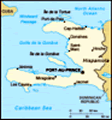Haiti
Advertisement
Advertisement
Background: The native Arawak Amerindians - who inhabited the island of Hispaniola clashed with Columbus in 1492 - were virtually annihilated by Spanish settlers within 25 years. In the early 17th century, the French established a presence on Hispaniola, and in 1697, Spain ceded to the French the western third of the island - Haiti. The French colony, based on exploitation of spicies, forestry and sugar-related industries, became one of the wealthiest in the Caribbean, but only through the heavy importation of African slaves and considerable environmental degradation. In the late 18th century, Haiti's nearly half million slaves revolted under Toussaint L'OUVERTURE and after a prolonged struggle, became the first black republic to declare its independence in 1804.
Haiti’s current situation is exacerbated by generations of political uncertainty, entrenched poverty and limited opportunities. Ranked 148 over 177 countries in UNDP’s Human Development Index for 2008, Haiti was considered a humanitarian crisis before the earthquake. Around half of the population is under 18 and population growth is a challenge to the country with no natural resources and a small territory of 27,700 square kilometers.
On January 12, 2010; an earthquake of magnitude 7.5 hit the capital city, Port-au-Prince, as well as the towns of Léogâne, Jacmel and Petit-Goâve. The physical damages are calculated in billions of US dollars. The loss of lives is estimated at 300,000 individuals with at least 1.5 million people internally displaced. Most of the loses is due to an excessively dense population, a lack of adequate building standards, the disastrous state of the environment, disorganized land use, and an unbalanced division of economic, public, and social activity. The capital city accounts for more than 65% of the country’s economic activity and 85% of Haiti’s tax revenue.
But if you venture outside of the republic of Port-au-Prince, one would discover what Amy Wilentz calls: "... Haiti the Cleopatra of countries—its ravishing natural assets, thrilling history, and magnetic culture have long made select visitors swoon. Its tortured past, however, has made it the Caribbean nation that tourism largely forgot". If you dare to travel to Haiti, the country will capture your soul and will take your breath away.
<Missing Content: tb_location_highlights_799>
<Missing Content: tb_location_hintsntips_799>


































